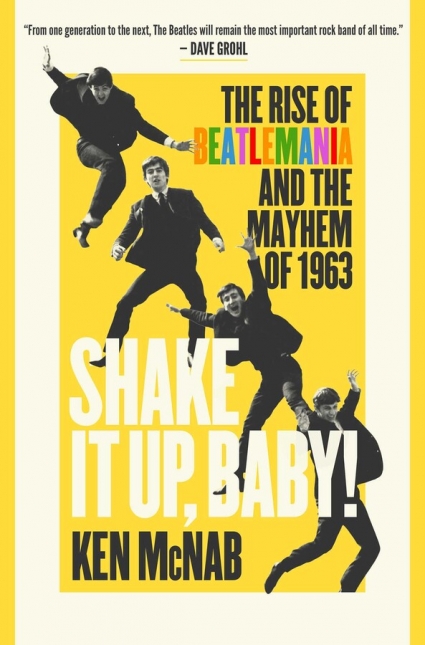Shake It Up, Baby!: The Rise of Beatlemania and the Mayhem of 1963
- By Ken McNab
- Pegasus Books
- 416 pp.
- Reviewed by Michael Causey
- June 4, 2024
Another not-necessarily-necessary addition to the Fab canon.

As retirement looms and I nervously eye threats to that wobbly political punching bag known as Social Security, I’ve been mulling some surefire income-generators to support me in my dotage. I’ll share my favorite with you here: A bookstore that only sells titles about Abraham Lincoln and the Beatles. It’s tentative name? Log n’ Roll.
I figure these two evergreen, can’t-fail subjects will ensure that I move enough inventory to live the lavish life I deserve in my twilight years. (I’m currently accepting pitches from venture capitalists.) And good news! I have an inaugural offering: Ken McNab’s Shake It Up, Baby!: The Rise of Beatlemania and the Mayhem of 1963. It’s a bookend of sorts to his previous volume, And in the End: The Last Days of the Beatles, which is not to be confused with his even more previous The Beatles in Scotland.
At Log n’ Roll, we’ve got ‘em all! But I must confess to wondering: Do we need ‘em all?
Look, I love the Beatles. I revere Lincoln. The former invaded America and improved it; the latter defeated invaders (think: Confederates in Gettysburg) and saved it. Each is amazing, compelling, and worthy of fresh attention from authors.
And yet.
McNab’s latest covers some pretty well-worn territory. The Beatles have inspired hundreds of books, documentaries, websites, podcasts, and more, the focus of which can often be narrow and granular. For example, we’ve had works zeroing in on the day John met Paul in Liverpool; on the band’s early times slogging it out as young musicians in Hamburg; and even on the impact of the Fab Four’s first Ed Sullivan appearance.
McNab is a solid if unspectacular chronicler. It’s unclear how much of this book is based on new research, but most of it felt like echoes of what I’ve read elsewhere. I did find that his treatment of the Jane Asher/Paul McCartney romance (Paul’s most serious romantic partnership before he met Linda Eastman) shed some unexpected light on their relationship, but those moments were few and far between as I turned the pages.
McNab also does a good job of acknowledging the Beatles’ debt to African Americans. “Their devotion to black American music was unambiguous in every way,” he writes. They refused to play before segregated audiences in the South. As Lennon explains in the book via a 1971 New York Times article:
“The one thing we always did was to make it known that these were black originals [we were performing], we loved the music and wanted to spread it in any way we could.”
McNab is on somewhat shakier ground when recounting a private holiday Lennon took with their gay manager, Brian Epstein, not long after John’s first child, Julian, was born. “Inwardly, [Lennon] was worried that he might have latent homosexual impulses,” he writes. Unfortunately, since the author doesn’t provide footnotes or much detail on his sourcing, we can’t verify where this provocative insight into Lennon’s mind came from.
Of course, we’ll certainly stock McNab’s book at Log ‘n Roll because we take our charter seriously. But I’m not sure whom I’d recommend the volume to; it’s a bit too inside baseball for the casual fan but lacks enough revelations for the diehard aficionado. I suppose Shake It Up, Baby! wouldn’t make a bad gift from a well-meaning aunt or uncle hoping to connect with a niece or nephew who’s shown a fledgling interest in the Fabs. The kid may not love it, but they’ll hopefully appreciate that their relative is trying.
Michael Causey hosts the “A Good Hour” radio program on WOWD 94.3 FM and takomaradio.org.

